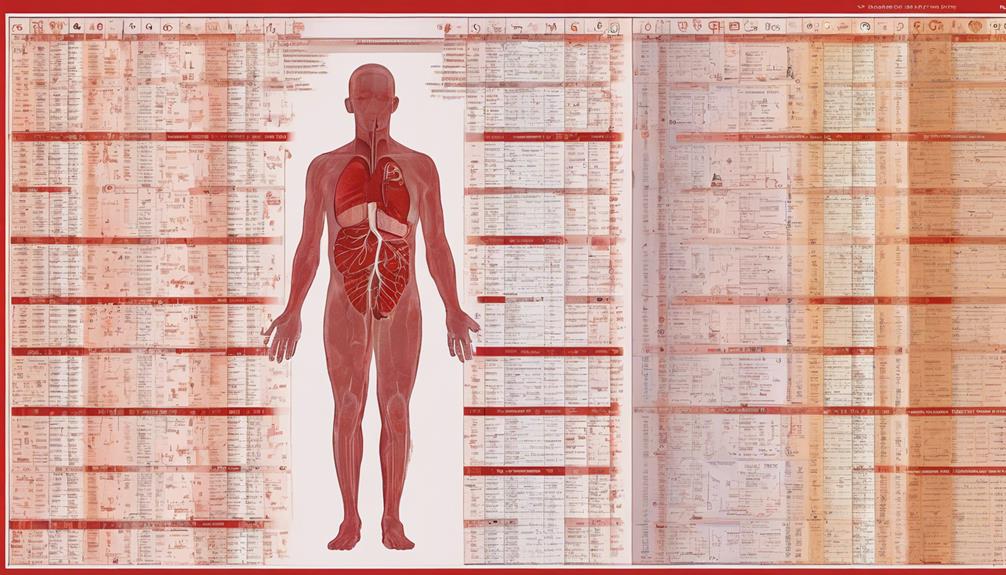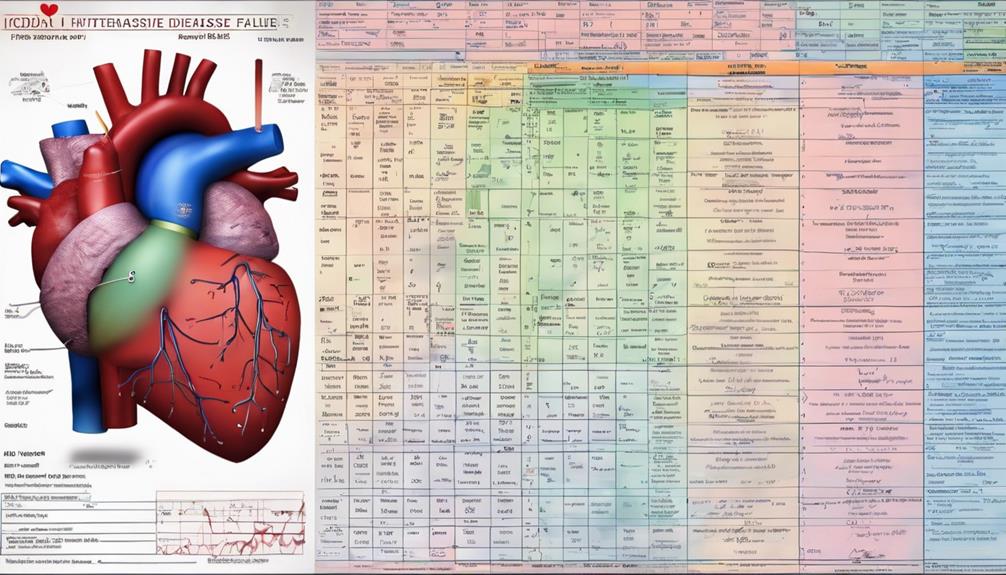Ever thought about the correct way to code Hypertensive Heart Disease with Heart Failure in ICD-10?
The complexity of distinguishing between hypertension and heart failure codes can be challenging. Understanding the intricacies of I11.0 and its implications on billing and patient care is crucial.
Stay with us as we explore the nuances of coding this condition and the impact of accurate documentation on healthcare outcomes.
Key Takeaways
- Accurate ICD-10 coding (I11.0) crucial for hypertensive heart disease diagnosis.
- Early detection through diagnostic tests vital for effective management.
- Medications and lifestyle changes essential in controlling hypertension and heart function.
- Regular monitoring and follow-ups help mitigate complications and improve prognosis.
Overview of Hypertensive Heart Disease
In hypertensive heart disease, high blood pressure directly impacts the heart's structure and function, leading to various complications. Hypertensive heart disease is a condition where the heart's ability to pump blood is affected due to prolonged hypertension. This disease with heart failure is a significant risk factor for developing heart failure, a condition where the heart can't pump enough blood to meet the body's needs. Hypertension and heart health are closely linked, as the increased pressure in the blood vessels strains the heart muscle over time.
Individuals with hypertensive heart disease may experience symptoms such as shortness of breath, fatigue, and fluid retention due to the heart's decreased efficiency in pumping blood. If left untreated, hypertensive heart disease can progress to more severe cardiovascular conditions, such as coronary artery disease. Therefore, effective management of hypertension is crucial in preventing the development of hypertensive heart disease and reducing the associated risks of heart failure and other cardiovascular complications.
ICD-10 Coding for Hypertension With Heart Failure

High blood pressure directly impacting the heart's structure and function necessitates accurate ICD-10 coding for the relationship between hypertension and heart failure. When coding for hypertensive heart disease with heart failure, it's essential to use the correct ICD-10 code I11.0, assuming a causal link between hypertension and heart failure.
The presence of high blood pressure can lead to changes in the heart that result in heart failure, highlighting the intricate relationship between these conditions. Proper documentation of this relationship is vital to ensure precise coding and appropriate management of patients with both hypertension and heart failure.
It's crucial to differentiate between cases where heart failure is directly caused by hypertension and those resulting from other factors like ischemic heart disease. By following specific ICD-10 guidelines and accurately coding hypertension with heart failure, healthcare providers can better assess cardiovascular risk, tailor treatment plans, and facilitate accurate billing for comprehensive patient care.
Clinical Presentation and Diagnosis
Upon encountering a patient with suspected hypertensive heart disease with heart failure, healthcare professionals must diligently evaluate the clinical presentation and diagnostic indicators to initiate timely and appropriate management.
Clinical presentation of hypertensive heart disease with heart failure may manifest with symptoms such as fatigue, swelling, irregular pulse, and weight gain. Diagnosis involves assessing signs like shortness of breath, difficulty sleeping flat, bloating, and increased urination.
These conditions necessitate a thorough evaluation as complications of hypertensive heart disease with heart failure can lead to issues such as an enlarged heart, coronary problems, arrhythmias, and even sudden death. Early detection through symptom awareness and diagnostic tests is crucial for prompt management of hypertensive heart disease with heart failure.
Regular cardiac evaluations, blood pressure monitoring, and kidney function tests play a vital role in the evaluation and treatment of this condition, helping to mitigate risks associated with heart disease and kidney disease.
Treatment Strategies and Guidelines

Evaluating the clinical presentation and diagnostic indicators is fundamental in formulating effective treatment strategies and guidelines for hypertensive heart disease with heart failure. Treatment for this condition typically involves a combination of medications to manage blood pressure and improve heart function. Lifestyle modifications play a crucial role in managing heart conditions, including adopting a heart-healthy diet and engaging in regular physical activity to reduce the risk of cardiovascular disease.
Guidelines recommend close monitoring of fluid intake, weight, and symptoms to ensure optimal management of hypertensive heart disease with heart failure. In severe cases, surgical interventions such as the implantation of devices or heart transplants may be necessary. Regular follow-ups with healthcare providers are essential to assess the effectiveness of the treatment plan and make any necessary adjustments. By following these treatment strategies and guidelines, individuals with hypertensive heart disease and heart failure can work towards improving their overall health and quality of life.
Prognosis and Complications
In managing hypertensive heart disease with heart failure, understanding the prognosis and potential complications is crucial for guiding treatment decisions and optimizing patient outcomes. Patients with this condition face an increased risk of developing complications such as arrhythmias and sudden death. The long-term prognosis hinges on factors like timely diagnosis, treatment adherence, and lifestyle modifications.
Complications associated with hypertensive heart disease and heart failure can result in an enlarged heart, coronary artery issues, and heightened mortality risk. Effective management of hypertension and heart failure is paramount in reducing the likelihood of complications and enhancing patients' quality of life.
Regular monitoring, medication adherence, and lifestyle adjustments play a pivotal role in averting severe complications in individuals grappling with hypertensive heart disease and heart failure. By addressing these aspects diligently, healthcare providers can contribute significantly to improving outcomes and prognosis for patients dealing with the complexities of heart disease and hypertension.
Frequently Asked Questions
What Is the ICD-10 Code for Hypertensive Heart With Heart Failure?
We know the ICD-10 code for hypertensive heart disease with heart failure is crucial. Proper coding distinguishes between hypertension and heart failure to ensure accuracy. Accurate documentation reflects the relationship between these conditions.
Using I11.0 implies a causal link, aiding in billing and treatment. Clear documentation supports patient care, emphasizing the importance of coding accuracy in cases of hypertensive heart disease with heart failure.
What Is Hypertensive Heart Disease With Heart Failure?
Understanding hypertensive heart disease with heart failure involves recognizing the interplay between high blood pressure and heart function. This condition signifies the impact of hypertension on the heart's ability to pump effectively, leading to heart failure.
Accurate diagnosis and treatment are crucial for managing this complex condition. By addressing both the underlying hypertension and heart failure, healthcare providers can improve outcomes for patients with this condition.
What Is the ICD-10 Code for Heart Failure or Heart Disease?
We use specific ICD-10 codes to classify heart conditions accurately. The code for heart failure falls under the range I50.-, distinguishing it from other cardiac issues. Proper coding is crucial for reflecting the link between hypertension and heart failure in medical records.
Accurate documentation ensures correct billing and treatment for patients with this condition. Understanding these codes aids in precise diagnosis and treatment planning for heart disease and related complications.
How Do You Code CHF and Hypertension?
When coding CHF and hypertension, we separate them in ICD-10 if not related. However, if a causal link is assumed, use I11.0 for hypertensive heart disease with heart failure. Proper documentation is key for accurate coding, preventing claim denials and ensuring correct reimbursement.
Following ICD-10 guidelines for hypertension (I10) and heart failure (e.g., I50.-, I51.4-I51.9) is vital for precision. Careful coding improves patient outcomes and streamlines the billing process.
Conclusion
In conclusion, accurate ICD-10 coding for hypertensive heart disease with heart failure is crucial for proper billing and treatment. By following coding guidelines and ensuring precise documentation, we can establish the causal relationship between hypertension and heart failure.
Stay updated on coding protocols and seek training to avoid claim denials and maintain quality patient care. The intersection of coding accuracy and patient outcomes underscores the importance of meticulous attention to detail in medical documentation.









